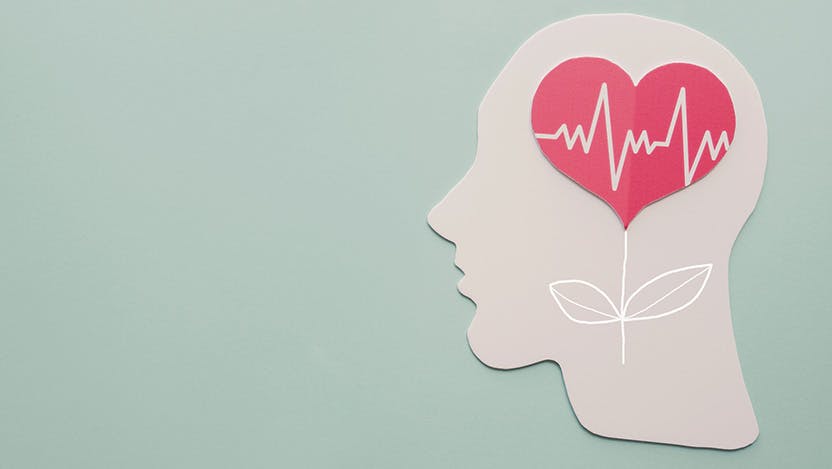Defining and understanding mental health

The term "mental health" encompasses our social, psychological and emotional well-being and impacts the way we feel, think and behave. It influences how we connect with others, how we make decisions and many other aspects of daily life. Poor mental health can impact physical health, increasing the risk for health conditions such as diabetes, heart disease and stroke. How we handle challenges and stressful situations also can affect our overall well-being.
At the University of Chicago Medicine, the mission to provide superior healthcare to patients and communities starts with a healthy staff who feel they are supported and have access to the resources they need. To bring increased attention to the topic and better define and understand the many facets of Royce Lee, MD, Associate Professor of Psychiatry and Behavioral Neuroscience, for an in-depth look into this very important topic.
Can you please define mental health?
Mental health is the state you are in when your body and mind are collectively working together. A helpful way to think of it is that your brain working in a way to serve you well. The brain is always doing as much as it can with very few resources. And there is a limit. When your mental health is doing poorly, you can begin to feel as if you’re spiraling or experiencing some type of disconnection in your world. That can ultimately lead to mental illnesses and leave an individual feeling stuck. I think it’s easy to remember that, just as your car will need a tune-up, your brain will need to restore its resources as well.
How do you know it’s time to seek help?
Sometimes we don’t know ourselves, but somebody close to us is aware that we need help. Sometimes, there’s a colleague, a friend or a family member who sees you struggling. Other times, we can know it’s time to seek help when daily life becomes challenging, even when stressors haven’t changed. So, changes in eating habits, sleeping patterns and having intense emotions, such as anxiety or despair, are some key signs for people to watch for.
What are some barriers?
I think that it’s also important to acknowledge the stigma associated with mental health. We need to normalize seeking counseling and help, and be comfortable with speaking out about our struggles.
There’s also the issue of access and the difficulties in getting care. Your primary doctor is always a great resource. They can begin treatment with you or begin the referral process. It is also important to be aware that, while it can be difficult to get an appointment, the emergence of telehealth has made it much easier to see a provider.
Can your mental health change over time?
For all of us, our mental health changes to help us adapt to the world around us. We can think of mental health as the sum total of mental, emotional and social resources available to meet the challenges the world throws at us. When our resources run low, we start to have symptoms or difficulties. Thus, the state of our mental health is always changing depending on the balance of resources and challenges. Research shows that most people will have mental health problems at some point in their lives; this is often not acknowledged when we try to think in terms of normal versus abnormal. The pandemic has made this clear to most of us. New research about mental health also reveals how tied our mental health is to our body.
For example, inflammation caused by activation of the immune system is very closely tied to what happens in our brain. Our inflammatory load changes from day to day depending on many factors: nutrition, pollution, stress, viral illness. Our mental health can follow along these ups and downs. This adds a new twist to the conversation that makes it clearer that sometimes the cause of mental health problems has nothing to do with the choices that we make or the values we may hold.
Is there a difference between mental health and mental illness?
There is an important difference between the concepts of mental health and mental illness. We increasingly think of mental health as a spectrum of mental and emotional wellbeing. Where we are on that spectrum is dynamic; it changes over time. It is entirely normal to have challenges at some point in our life. On the other hand, mental illness is a medical and scientific understanding of things like depression, post-traumatic stress disorder, manic depression and other disorders treated with psychotherapy or medications. It is helpful here to think of medical illness as an example. If a person has a history of high blood pressure that is controlled with medications or diet and they feel healthy, are they “ill?" Most people would say no, that person is not medically ill. In other words, disorders are mental illnesses. However, people are not “mentally ill” really. It is more accurate to say there are people who may have a mental illness.
It is understandable that these terms are confusing. As with most ideas, we inherit ideas from the ages that came before our own. Historically, ideas of demonic possession and really catastrophic psychiatric problems were shaped by issues such as neurosyphilis. Our cultural or instinctive view of even milder problems like depression, known previously as melancholia, were shaped by cultural experiences of these states as untreatable. And many problems that we now consider to be “mental illnesses” were not recognized at all.
So, in summary, mental illness is a term used for clinicians to guide therapy and scientists to study disorders. As people and as a society though, thinking of mental health as a dynamic state with ups and downs is much closer to the truth of how things actually work.
How common are mental illnesses?
According to the CDC, more than 50% of people will be diagnosed with a mental illness or disorder at some point in their lifetime, and 1 in 5 people in the U.S. will experience mental illness in a given year. In addition, 1 in 5 children have had or will have a seriously debilitating mental illness.
What is something that you would especially want people to understand and know about mental health?
Mental health problems are normal and not a sign of abnormality. It is not a sign of a moral flaw. And how we cope or learn to cope with the resources given to us looks different for everyone. It is really important that we decrease the stigma around asking for help.
Mental Health Care
We provide care for patients with mental and behavioral health issues in order to help them lead a productive, healthy life.
Learn more about our psychiatry and psychology services
Royce Lee, MD
Royce Lee, MD, is a psychiatrist who specializes in treating patients who suffer from depression, personality disorders and post traumatic stress disorder (PTSD).
Read more about Dr. Lee.